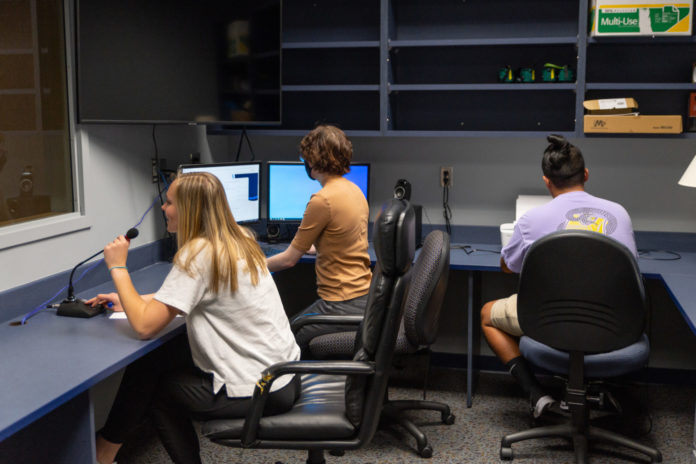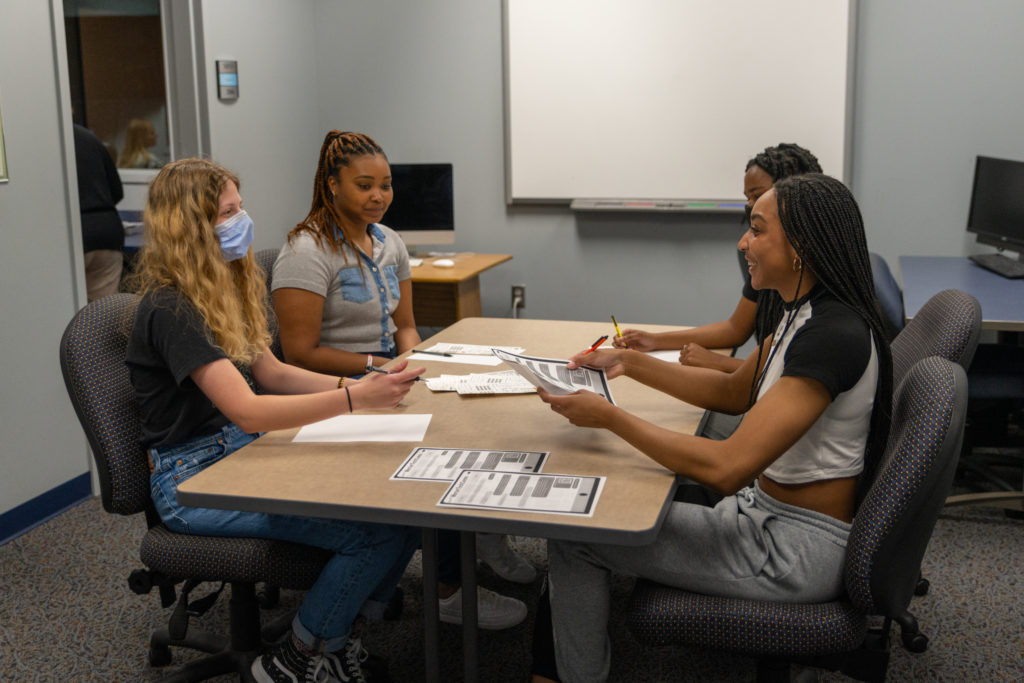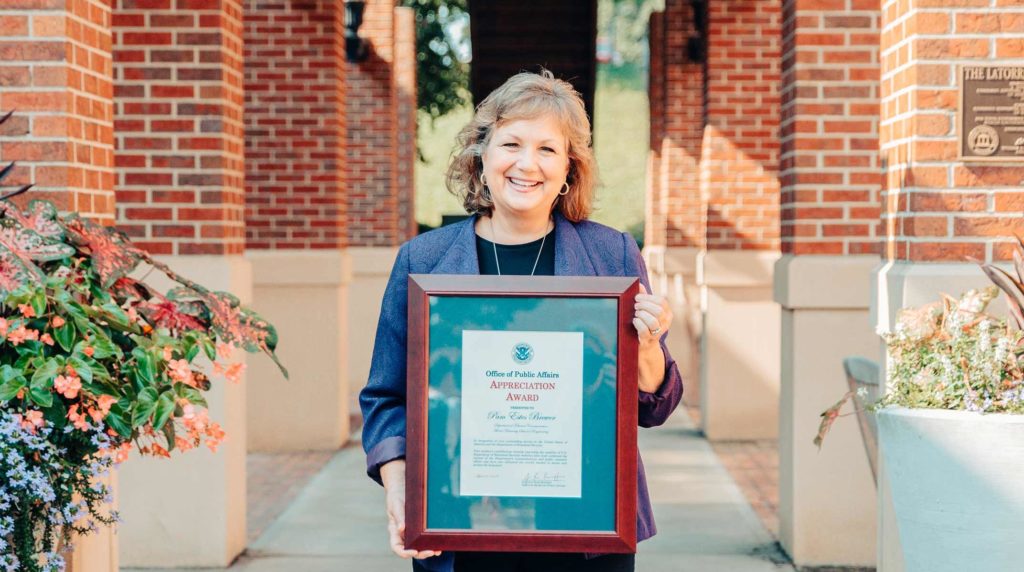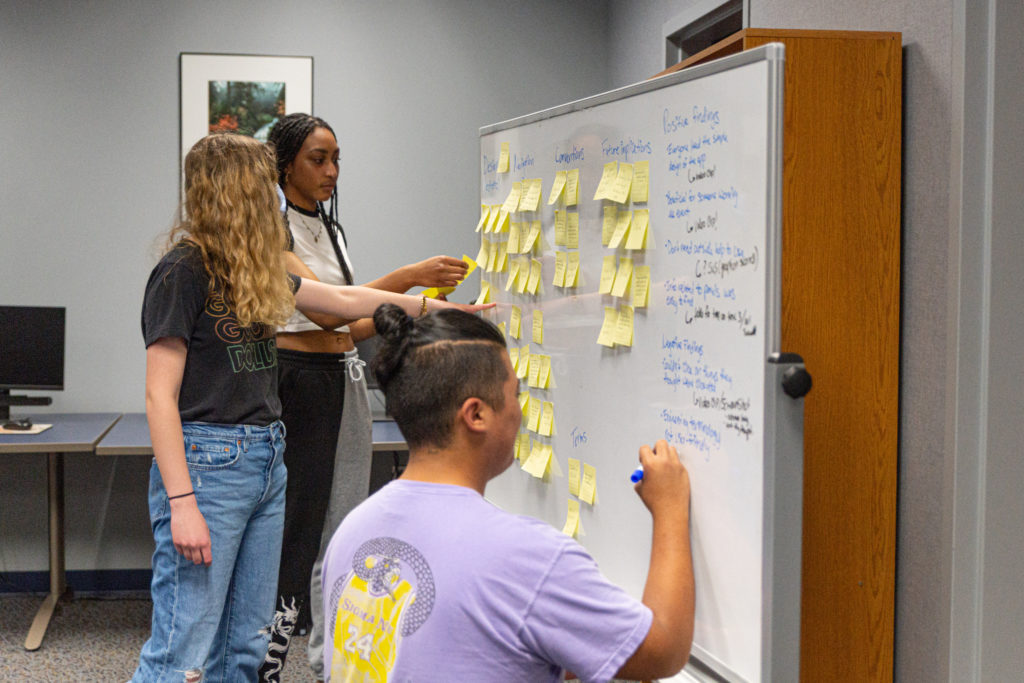
Feedback provided by Mercer technical communication students has played a part in improving U.S. Department of Homeland Security (DHS) websites, including the newly redesigned DHS.gov.
This is the sixth year that Dr. Pam Brewer’s students have conducted usability studies for DHS. A technical communication professor in the School of Engineering, Dr. Brewer teaches an undergraduate usability course every spring and a graduate-level usability course every other year. In total, about 75 students have been involved in the DHS project so far.
“It just keeps getting better and better and better, which is awesome,” said Matt Harmon, director of Web Communications for DHS and Dr. Brewer’s point of contact for the partnership. “It’s nice to have a good, steady, stable relationship with somebody that you can build on, and it’s really been a partnership which has been absolutely fantastic.”
Students spend the first half of the semester learning about usability theory and practices and sometimes assessing the website of a local agency or organization. The second half is spent evaluating specific DHS websites, Dr. Brewer said. They have virtual meetings with representatives of the sites, design test plans, recruit participants in their target audience for usability studies, and interview and observe the participants as they navigate the websites. In addition to the overall quality and appearance of a website, they look at how easy it is for users to find what they’re looking for and how the experience could be improved.
The usability studies are generally conducted in the usability lab in the Science and Engineering Building, which is being expanded to include biometrics technology like eye tracking and pulse rate monitoring. When the COVID-19 pandemic emerged in early 2020, students didn’t miss a beat when they had to redesign their studies for Zoom, Dr. Brewer said.
After analyzing the data from the studies, the students present their findings virtually to their DHS contacts. High-level staff with the Centers for Disease Control and Prevention, Department of Health and Human Services, and General Services Administration have also participated in the meetings.

“Our students in doing this work are serving the United States in a really significant way,” Dr. Brewer said. “We’ve got this wonderful relationship going where Mercer is actually contributing to the usability of government information to the American public. I expect that only to grow.”
Mercer students have analyzed DHS websites related to careers, science and technology, cybersecurity, disaster response through the Federal Emergency Management Agency, the Ready.gov disaster planning initiative, the Countering Violent Extremism Task Force, “If You See Something, Say Something” campaign, REAL ID Act, the Federal Law Enforcement Training Centers (which is based in in Glynco) and the U.S. Coast Guard.
Two of Dr. Brewer’s former students, Cathy Hu and Sydnei Mayers, tested and evaluated the two main government websites for coronavirus information in summer 2020. They were awarded DHS certificates of appreciation in recognition of their work, Dr. Brewer said. In addition, Dr. Brewer and the Department of Technical Communication received an appreciation award from DHS, recognizing their contributions toward improving the usability of DHS websites, in April 2019.
More recently, Mercer students have provided feedback on the new DHS.gov, which was rebuilt using the federal government’s U.S. Web Design System and launched in February, Harmon said. The site is one of the first large-scale enterprise websites to use the new design system.
Improving DHS websites is one of the priorities set by Secretary of Homeland Security Alejandro Mayorkas in response to the President’s Management Agenda, released earlier this year. One of the main focus areas of the agenda is improving customer service experience for the federal government, which includes the user experience for federal websites since that’s how most Americans interact with the government.
“The work that we’ve done with Dr. Brewer’s team at Mercer has really laid the groundwork for us to hit the ground running to be able to make those levels of improvements,” Harmon said. “A lot of the decisions that we made on that (DHS) site were directly related to recommendations that we received over the years from Dr. Brewer’s usability team. We paid attention; we listened.
“It’s not an understatement to say that some of the work they’ve done is, obviously, informing DHS web decisions, but it’s also informing decisions made for federal government websites as a whole.”
The partnership with Mercer allows DHS to hear from people “outside of the beltway” (Washington D.C.) about how the websites and services can be improved, which is invaluable. Harmon touted Mercer’s involvement to Mayorkas recently during a presentation about the new website.

“This shoutout means so much because the students love it when they feel like what they’re doing really counts,” Dr. Brewer said. “This project, it does count, and they know it. I can’t say how much I appreciate them developing this project with our students. It makes me really proud.”
The Mercer team will assess portions of the new DHS.gov in the coming weeks. Chloe Carter, a senior technical communication major, said her class will be looking at the website as a whole and its mobile navigation, as well as testing pages like Report Suspicious Activity, Frequently Asked Questions, National Terrorism Advisory System and REAL ID.
“I’m excited about a lot of things about the project,” Carter said. “(Usability) is something I’m interested in doing once I get a job. I’m excited to get more experience, so I can feel comfortable. It’s a government entity, so that’s a super big client that we’re working with directly. The information we are giving them is valuable, which is really cool.”
User experience is a trending field right now, and Mercer students who participate in the DHS project gain experience that sets them apart, Dr. Brewer said. They learn how to gather data, analyze information, present credible results, do research that instigates change, and make interfaces more usable and accessible.
Kim Wallace, who graduated in 2021 with majors in creative writing and technical communication, said Dr. Brewer’s class was her introduction to usability. Now, she’s working full time in the user experience department at NCR Corp. in Atlanta, while also working toward a master’s degree in technical communication management at Mercer.
When she interviewed for an internship with NCR, the first thing her interviewer did was ask about the DHS project. With two usability projects already under her belt — more experience than most of the other interns — Wallace felt confident with her skills when she started the position, which eventually turned into a full-time job.
“I do believe that project was very key in me getting the internship and full-time position,” Wallace said. “I definitely want to stay in usability. I want to see what I can do just to make online spaces easier to access for anyone who might need it.”









